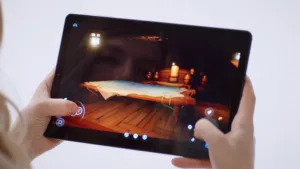Microsoft has revealed it is developing a global game-streaming platform, currently called Project xCloud, for Xbox One console gamers and PC users. The service can also be used on a mobile device, using an Xbox One controller connected via Bluetooth or the device’s built-in touch input. In an official blog post, Kareem Choudhry, Corporate VP of Microsoft’s Gaming Cloud division, commented:
“Dev
elopers of the more than 3,000 games available on Xbox One today — and those building the thousands that are coming in the future — will be able to deploy and dramatically scale access to their games across all devices on Project xCloud with no additional work”.
The service will use Microsoft’s cloud computing platform, Azure. Describing the development of Project xCloud as a “multi-year journey”, Choudhry says the service is being tested in-house now and that public trials will begin in 2019. He continued:
“We’ve enabled compatibility with existing and future Xbox games by building out custom hardware for our data-centres that leverages our years of console and platform experience. We’ve architected a new customisable blade that can host the component parts of multiple Xbox One consoles, as well as the associated infrastructure supporting it. We will scale those custom blades in data-centres across Azure regions over time”.
Developers and researchers are currently working on ways to combat latency while preserving the graphical fidelity and native frame rates of games, through a combination of networking topology and video encoding and decoding. The service will also be usable via 4G and 5G mobile networks, dynamically scaling to match the capability of the connection. Choudhry concluded:
“Currently, the test experience is running at 10 megabits per second. Our goal is to deliver high-quality experiences at the lowest possible bitrate that work across the widest possible [range of] networks, taking into consideration the uniqueness of every device and network”.
Analyst Comment
Microsoft has made great strides over the past 18 months, including the launch of the Xbox Game Pass service, which enables users to download local versions of a rotating library of games for $10 a month. Recently, the service was expanded to include all first-party releases, made available for download via the service on launch day.
Hopefully, the company has taken note of the shortcomings of its closest competitor, PlayStation Now which, at $20 a month, is priced significantly higher than both Xbox Game Pass and Nvidia’s GeForce Now PC game streaming service.
Recently, Sony has tried to catch up with Microsoft by offering local downloads for PlayStation 4 titles, much like Xbox Game Pass. Unfortunately, PlayStation Now doesn’t offer anything resembling a recent title.
If Microsoft gets this right, it could significantly change the way we play video games and the company could claw back some of the share it lost to market leader Sony at the turn of the current console generation. (AF)
I have been reporting on gaming in the cloud for a long time, but a good experience depends not only on the bandwidth of the connection, but also the latency. 5G promises very low latency and fixed broadband 5G services could radically change the level of performance. That could help to drive the development of 5G if service providers can find a way to get a share of potential revenues, in cities, anyway, where 5G will initially be installed. (BR)

